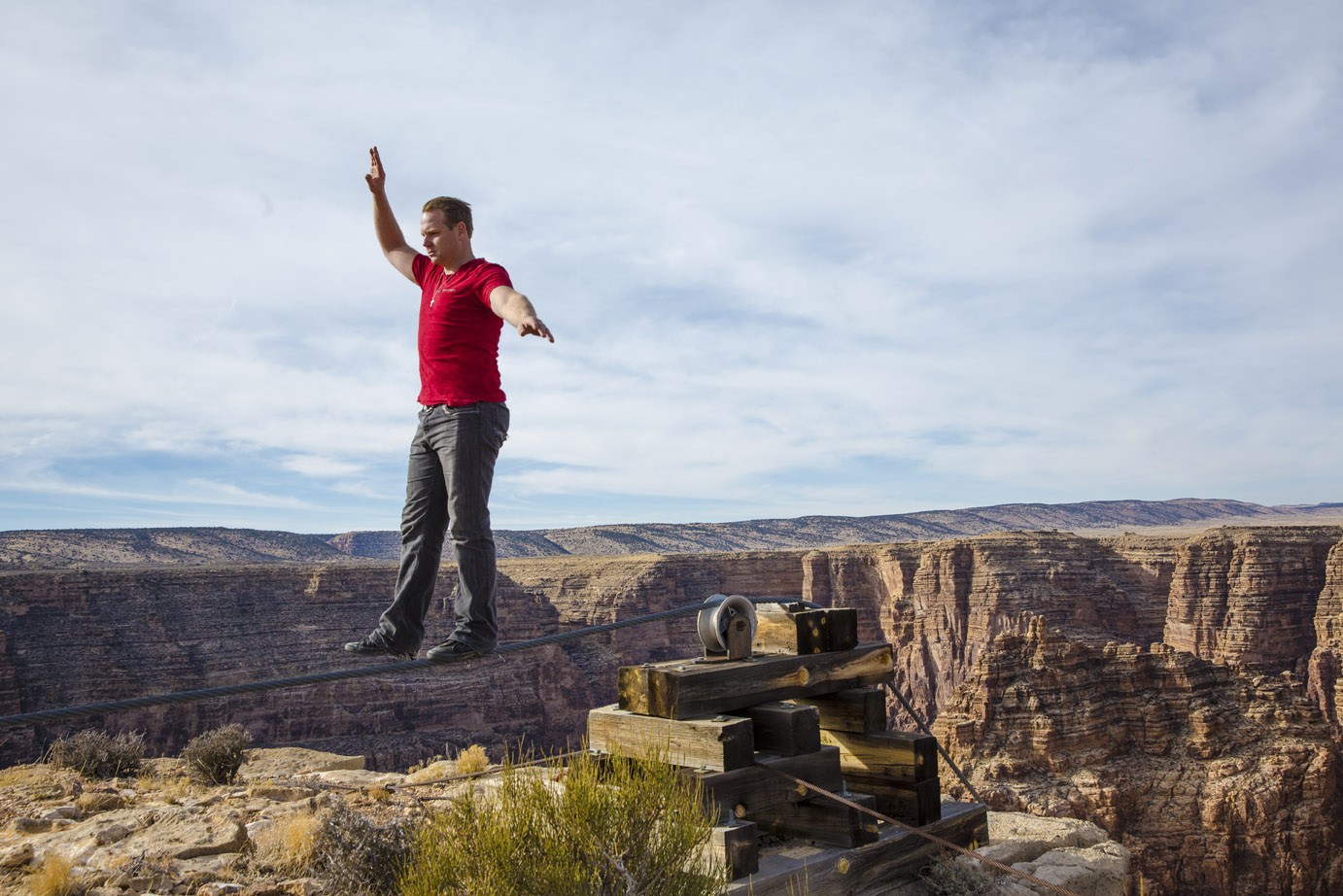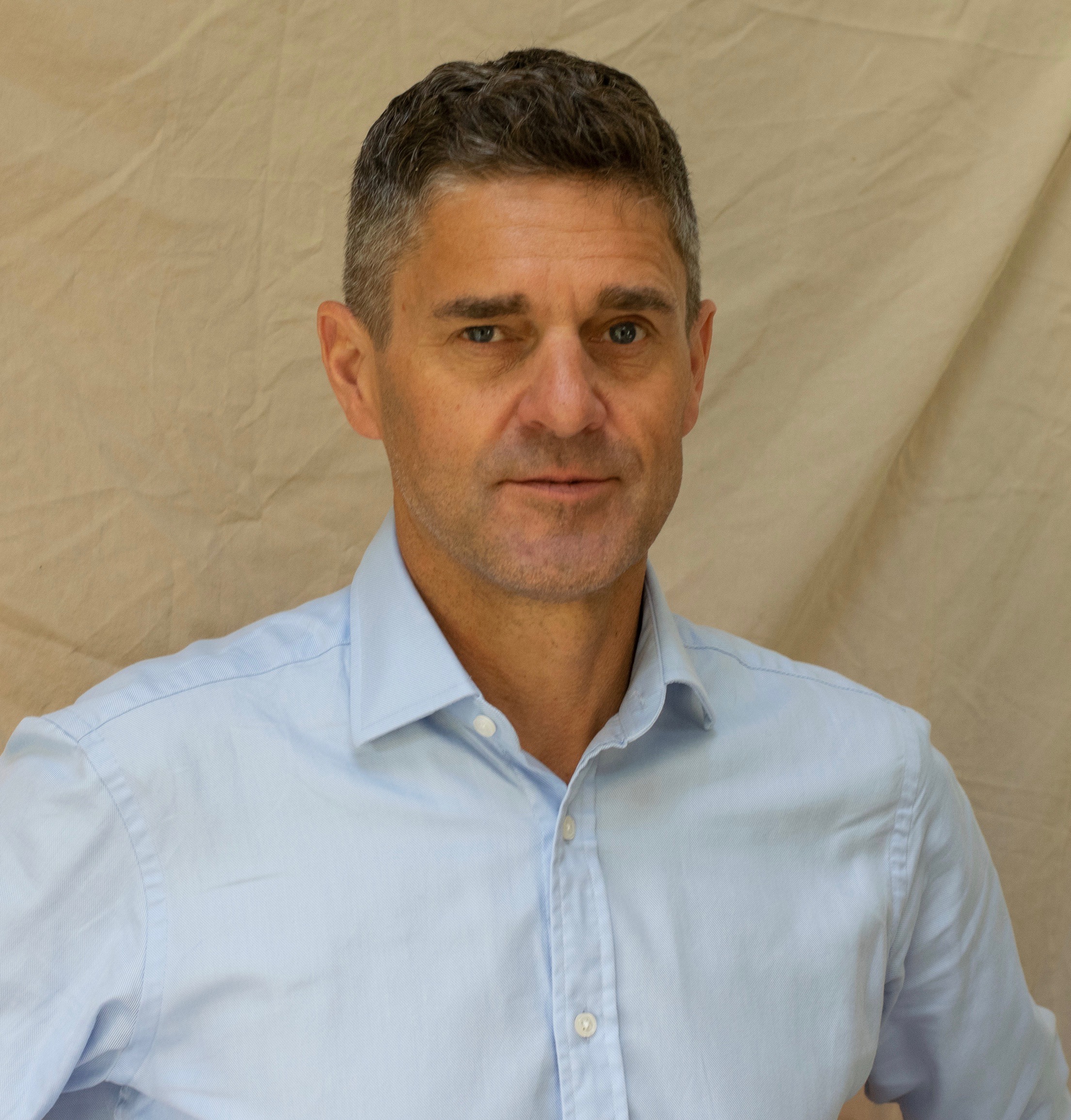Is Nic Wallenda the world's bravest man?

The latest updates, reviews and unmissable series to watch and more!
You are now subscribed
Your newsletter sign-up was successful
Want to add more newsletters?

ONCE A WEEK
What to Watch
Get all the latest TV news and movie reviews, streaming recommendations and exclusive interviews sent directly to your inbox each week in a newsletter put together by our experts just for you.

ONCE A WEEK
What to Watch Soapbox
Sign up to our new soap newsletter to get all the latest news, spoilers and gossip from the biggest US soaps sent straight to your inbox… so you never miss a moment of the drama!
Very early on Monday morning, Nic Wallenda will attempt to walk on a high-wire across the Grand Canyon in the US. Incredibly dangerous, incredibly risky Nic will also have to deal with the fact his feat is being shown LIVE on TV, on the Discovery Channel...
First question – why?
"People won’t understand why I would do something so dangerous because it’s not relatable. I consider being a police officer more dangerous than what I do. I’m in control of myself while I’m on that wire. I’m not in control of Mother Nature, of course, the winds and such, the mist, the rain. But I am in control of myself and I can train for that mist, and I can train for that wind. Being a police officer you can train as much as you want, but when that criminal comes up behind you with a gun, there’s nothing you can do, you’re not in control.
"I think people don’t understand that and so they think this guy, he must be insane. Well, the truth is I have a beautiful wife, three beautiful children and you know, I don’t plan on leaving this world anytime soon. But this is my passion: I started walking wire at the age of two. My family history dates back to the 1780s and now for seven generations we have been walking wires. One thing that people don’t realise - and any entertainer will tell you – is that as soon as you're in front of an audience there’s something that kind of takes you over to the point where you can’t get away from it, it’s something that you love doing."
Your great grandfather died walking a wire. How much will that be in your mind?
"What I do is extremely mental; it’s probably more mental than physical. So it’s important that I don’t allow the thought of things like that to take over. My great grandfather was walking between two buildings in San Juan, Puerto Rico in 1978, he was 73, and the engineering was done improperly on the wire, so it was not tensioned to the right tension, it was moving under his feet."
How can you be sure that won’t happen to you?
The latest updates, reviews and unmissable series to watch and more!
"If there’s ever an issue when I’m walking across the Grand Canyon or anywhere, I would go down to the wire immediately, and that wire’s a safe haven. And that wire we know is engineered to hold five times anything that I would ever stress on it. I know that wire’s safe. For the Grand Canyon for example I would go down to the wire, and I have rescue teams on each side, one on the north side, and one on the south side. They could be to me within 30 seconds and bring me to safety, so we do think about everything. It’s not that I think I’m invincible: as a matter of fact, I know I’m far from it, I’m a human and humans make mistakes.
"We try to eliminate as many of those mistakes as possible: during training I’ll train in updrafts and side drafts of wind up to 50 miles an hour so that I’m prepared for the worst case of what we expect to see out there while I’m crossing over the canyon. Again, a lot of that is more mental training, so that mentally I know that I can withstand what I’ll face out there. You know, leading up to it, minutes before, hours before, it’s very, very stressful and I focus during those times on training, and I tell myself look, you’ve done it, you’ve walked the same distance, you’ve walked the same tension cable and you’ve walked in winds that are worse than what you’re going to face. You know you can safely make it across. It’s not as though I just go out there and say ‘well I’m invincible, if I fall, I fall’, no, we’ve got rescue crews, I will grab that wire. There’s stuff that I train for."
What are the things that you fear on the day itself?
"Well, you know, fear is a choice and dangers are real, so I don’t fear, because I can choose whether I want to fear or not: it’s all a mental thing again. But the danger is real, and the truth is it's really winds. The winds are very unpredictable in the Grand Canyon, there’s a large canyon 1500 feet deep where I’m walking, where those winds come around a corner and they change rapidly. So those are the things that are out of my control. OK, I know I can walk on this cable, I know I’ve done this distance, I know I have the endurance, I know I have the strength. But we can’t control those winds."
Does it add stress knowing you’ll be watched all over the world, live?
"You know, having a large audience, that’s what I’ve done my whole life. I’m not doing it on my own, I’m doing it with the world watching. And in this case it really is the world – at the last count they’re going to air this in 219 countries. And that’s exciting more than anything to me, it does not add stress. What I do is stressful enough that you don’t even focus on things like that at that point."
If you succeed will this be the greatest piece of wire-walking ever?
"You know, I couldn’t say that. I would rather let the viewers be the judge of that. It is something that no one in the world has ever done, it’s something that is life or death, live on TV around the world, and you know, if I were to fall, there’s a 0.00 chance that I would survive. I have a long list of dreams and this is one of the big ones."
What’s going through your head when you first step off the edge of the Grand Canyon onto the wire?
"You know, there’s definitely a lot of stress, there is, but once I get on that wire it becomes surreal almost, I kind of get into my own world, into my own zone, and then I’m on a mission and my mission is to safely make it to the other side and I get into a zone where that’s what I’m going to do, nothing’s going to stop me, I’m going to stay in this zone and make it to the other side. Again, there is stress, there are nerves, for sure. I mean I would be super human, which I don’t think anyone’s super human, to not have nerves."
Patrick McLennan is a London-based journalist and documentary maker who has worked as a writer, sub-editor, digital editor and TV producer in the UK and New Zealand. His CV includes spells as a news producer at the BBC and TVNZ, as well as web editor for Time Inc UK. He has produced TV news and entertainment features on personalities as diverse as Nick Cave, Tom Hardy, Clive James, Jodie Marsh and Kevin Bacon and he co-produced and directed The Ponds, which has screened in UK cinemas, BBC Four and is currently available on Netflix.
An entertainment writer with a diverse taste in TV and film, he lists Seinfeld, The Sopranos, The Chase, The Thick of It and Detectorists among his favourite shows, but steers well clear of most sci-fi.


